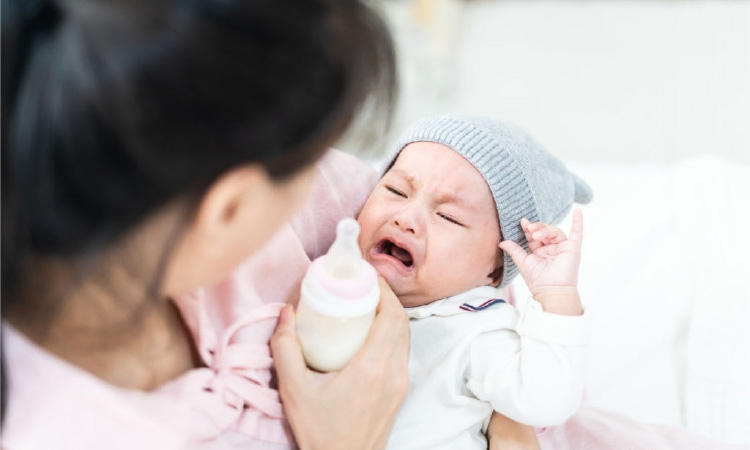Hunger is one of the main reasons why babies cry. Whenever a baby cries, the most common inference is baby might be hungry. But what if the baby cries after feeding? Crying babies after feeding is something that confuses and worries the mothers.
Since the baby’s crying after every feeding upset both the mother and the baby, it is very important to understand the possible reasons and ways to deal with it.
Why Does My Baby Cry Immediately After Feeding?
There is no single reason to point out that explains why the babies constantly cry after feeding. Baby crying after feeding do not always indicate a serious health issue that necessitates medical attention.
The reasons for crying after each feeding range from minor issues like colic to major issues like lactose intolerance, a severe allergy that needs rectification. Also, it is important to consider the chances that babies cry after feeding as they are still hungry because of not getting enough milk. There are a few reasons you feel that your baby is always hungry.
Why Does A Baby Cry After Feeding- 8 Reasons
So the baby has been well-fed, has even been changed and seems like everything is fine. But just when you heave a sigh of relief and want to sleep with the baby, the baby starts to cry. Following are the top 8 reasons for baby crying after feeding
1. Colic
Colic is a condition common among babies under 3 months. Colicky baby cries after feeding. They tend to cry for 2-3 hours every day and cry for three or more days in the week. More than one reason can cause colic in babies. The gas build-up is one of those reasons.
Colicky babies feel gassy after feeding and may start crying abruptly after every feeding. They tend to cry at certain times of the day and cry almost at the same time every day.
Bottle-fed babies and breastfeeding babies are equally susceptible to colic. It has been found that about 20% of babies experience colic. The digestive system of the baby is still in the developing phase, making them more prone to problems such as colic.
Related Reading: How And When To Use Apple Juice For Baby Constipation (Till 2 Years)
2. Excessive gas formation
As the digestive system of the babies is still immature, they are prone to indigestion and gas formation. Besides, formula-fed babies tend to swallow a lot of air while feeding. This results in the accumulation and trapping of gas in the stomach.
Trapped gas can potentially cause pain and discomfort soon after feeding and the baby cries a lot after every feed. Baby cries after feeding formula not because they are still hungry but most probably due to excessive gas in the stomach. This is because bottle-fed babies are more prone to swallowing a lot of air during feeding than breastfed babies.
Although bottle-fed babies are more affected, breastfed babies also face this issue. Poor latching, oversupply, or strong let-down and mom’s diet can contribute to gas formation in breastfed babies.
Related Reading: 21 Breastfeeding Tips For First Time Mothers
3. Acid reflux
Baby crying after feeding one hour can be due to acid reflux. Acid reflux happens when the LES (lower esophageal sphincter) is not closed properly. This results in the stomach content along with the gastric juice move up to the esophagus and sometimes to the mouth.
Babies are more prone to acid reflux than adults. This is because:
- Babies have a liquid diet that can easily get into the esophagus
- The Oesophagus of babies is undersized
- LES of babies is weak or underdeveloped
- Babies spend more time lying down
Acid reflux can cause pain in babies. Therefore, babies tend to cry as milk comes up their esophagus after feeds. If the baby is crying due to acid reflux, it more often vomits after crying and then tends to settle down.
Repeating episodes of acid reflux could be a sign of a more serious issue called gastroesophageal reflux disease or GERD that requires medical attention.
4.Teething
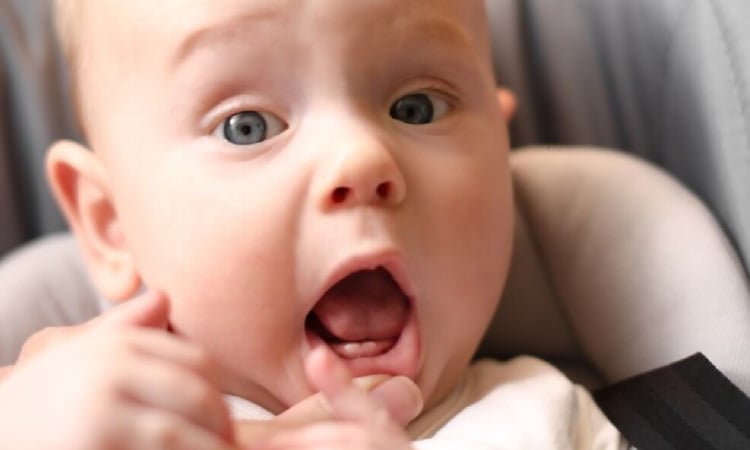
Teething is another reason why the baby cries after feeding. During the phase of teething, the baby’s gums become sore. Sore gums can bring about discomfort and pain in babies while they are sucking milk.
Thus, teething contributes to fussy nursing behavior. There are a few things to know if your baby is teething. During the teething time, the baby starts to nurse, but due to pain, stop nursing. Not only do breastfeeding babies cry due to teething but baby crying when feeding bottles due to sore gums is also common. The pain and unaddressed hunger make the babies cry after every feeding.
5. Ear pain and fever
Babies are prone to ear infections. They usually contract ear infections when they catch an upper-respiratory infection like a cold. More often fever accompanies ear infection. Fever and ear pain can get in the way of feeding and babies tend to be cranky and cry after feeding.
6. Nose block
A stuffy nose is one of the reasons why a baby cries after feeding. A stuffy nose may interfere with feeding. The baby has to coordinate breathing and sucking when breastfeeding and the stuffy nose will make it difficult. The baby might feel hungry as they fail to gulp enough milk. All this frustration can make the baby cry after feedings.
7. Allergies and intolerance
These are two serious issues that need to be addressed as soon as detected. The reason for the baby’s cry after feeding can be due to milk allergy or lactose intolerance. In both cases, the baby experiences stomach pain, vomiting, bloating, and upset stomach.
The abdominal cramps experienced immediately after feeding due to allergy or intolerance can make the baby cry after every feeding. Sometimes, mother’s diet can trigger allergy or intolerance in babies. This makes breastfed babies cry after feeding sessions.
Related Reading: 15 Common Foods That Can Be Unsafe For Babies
8. Side effects of the formula
If formula-fed babies tend to cry after consuming a certain brand of formula, the baby could be sensitive to the ingredients present in them. Different formulas have different ingredients.
If ingredients of a particular formula are not suiting the baby, he or she may develop digestion problems and abdominal pain. This can lead to a baby crying after feeding.
6 Ways To Stop Baby Crying After Feeding
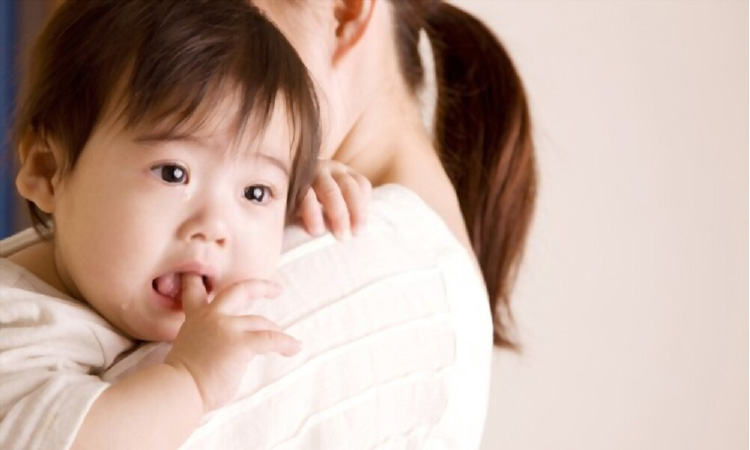
A crying baby is perhaps the most distressing sight for parents. Identifying the reason for your baby’s crying will help you to stop the baby from crying after feeding. Following are 6 ways to stop the baby from crying after feeding.
1. Making the baby burp will help
An important step of feeding, especially bottle feeding a baby is burping. Skipping this step will increase the baby’s risk of becoming a gassy baby. Thus, chances of crying after feeding also increase. Burping helps to get rid of the air swallowed by the baby while feeding.
This way burping helps to stop a baby from crying after feeding due to developing gas. Letting the baby burp between and after feeding helps to prevent the accumulation of gas in the stomach. Also, you should be aware that you are not overfeeding your baby.
Usually, breastfed babies swallow relatively less air than bottle-fed babies. But because each baby is different, it is good to practice burping the breastfed babies after every feeding.
Note: *Put a towel on your shoulder while burping the baby after feeding as they normally spit up a small amount of stomach contents while burping.
2. Give a break during feeding
If the baby is exhibiting the signs of acid reflux and you doubt that is the reason for the baby crying after feeding, giving a break in the course of feeding will help. Frequent break of few minutes while feeding gives some time for the stomach content of the baby to settle. This helps to inhibit the tendency to reflux.
Related Reading: 6 Benefits And 5 Concerns Of Comfort Feeding
3. Changing the brand of formula may help
If formula feeding always ends up in crying, or if the baby starts to cry after feeding recently, only after you changed your usual formula, then the formula might be the culprit.
Not all formula suits all babies. Like how all babies are different, the ingredients in all formulas are also different. When you introduce a formula for the baby, it is important to closely monitor the baby after each feed for signs of discomfort.
Some mothers try more than one formula before settling to one that works the best. But we suggest talking to the doctor before going for a trial of different brands of formula.
Anyhow if the baby cries every time after formula feeding, consider switching the formula. If the baby is sensitive to more than one brand, consider trying specific formulas made for sensitive babies. Here is a list of 10 Indian baby foods for 4-6 months old babies.
4. Give baby teething toy before feeding
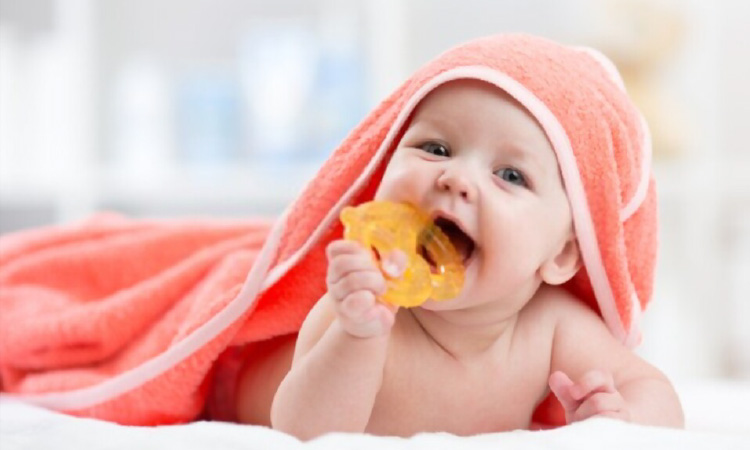
If teething and sore gums are the root cause of the baby crying after feeding, giving the baby a teething toy before each feed will help to stop the crying. The teething toy helps to soothe the sore gums. When the baby feeds after reducing the gum irritation, the feeding will not be interrupted and the baby is less likely to become cranky.
Note*: Make sure that you only give your child toys that are specifically meant for teething.
Related Reading: 8 Disadvantages Of Teethers For Babies
5. Give your baby more tummy time
Giving the baby more tummy time and making the baby do some basic exercises are excellent ways to improve the muscular dexterity of the infant.
Tummy time creates enough pressure in the abdominal cavity to allow gas to pass through instead of accumulating.
Basic exercises that help to relieve the gas fast and stop the baby crying after feeding are:
- Let the baby lie on its back and move the legs in a cycling motion
- Bend the baby’s legs towards the abdomen to an extent that the knee touches the abdomen. Repeat this a few times
Related Reading: 11 Tips To Encourage Babies To Roll Over
6. Belly massage for gas relief
Baby massages have been an integral part of our Indian culture. And infact, it has been scientifically proven that baby massages offer many benefits. Abdominal massage for babies consists of different kinds of strokes that are designed to encourage trapped air to move towards the bowels. There are different kinds of belly strokes. Your child’s doctor will help you with it.
When giving a child an abdominal massage, it should be rhythmic and gentle.
Some Tips To Avoid Baby Crying After Feeding
Taking care of certain factors will help to avoid the reasons that lead to the baby crying after feeding. Following are some tips to reduce the instances of the baby crying after feeding
- While bottle feeding baby, choose slow flow nipples over the fast flow ones
- If you notice the baby is ingesting lots of air during feeding, change the feeding style to minimize this issue. You can seek help from a lactation expert here
- Moms’ diet matters. Therefore, breastfeeding mothers should watch their diet by avoiding foods that may cause an issue for the baby
Related Reading: Foods To Avoid During Breastfeeding
Should I Seek Medical Attention If Baby Cries After Feeding?
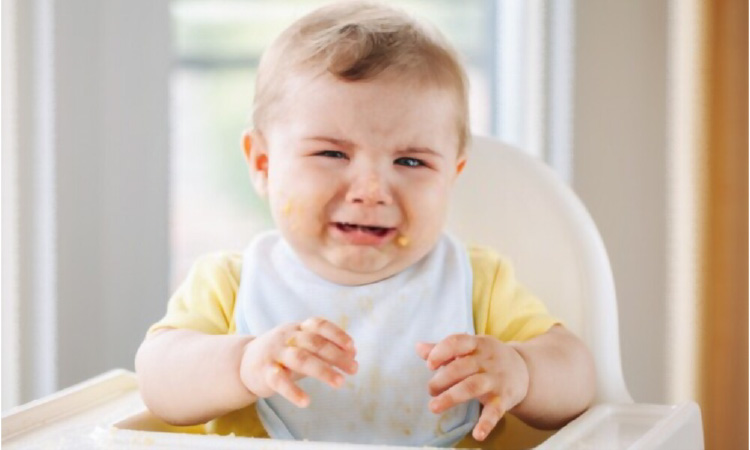
If the baby cries after feeding and exhibits warning signs like fever, blood in stools, persisting diarrhea and vomiting, and extreme lethargy and drowsiness, it could be the signs of some underlying serious issue. Hence it should be medically addressed.
Related Reading: 12 Relevant Things To Know Before Choosing A Pediatrician
Conclusion
Seeing your baby cry after feeding can take a toll on you, especially if you aren’t able to figure out the reason why the baby is crying inconsolably. Taking a systematic approach to check the foods and eating habits that cause your baby’s discomfort can help you reduce problems and find corrective methods
